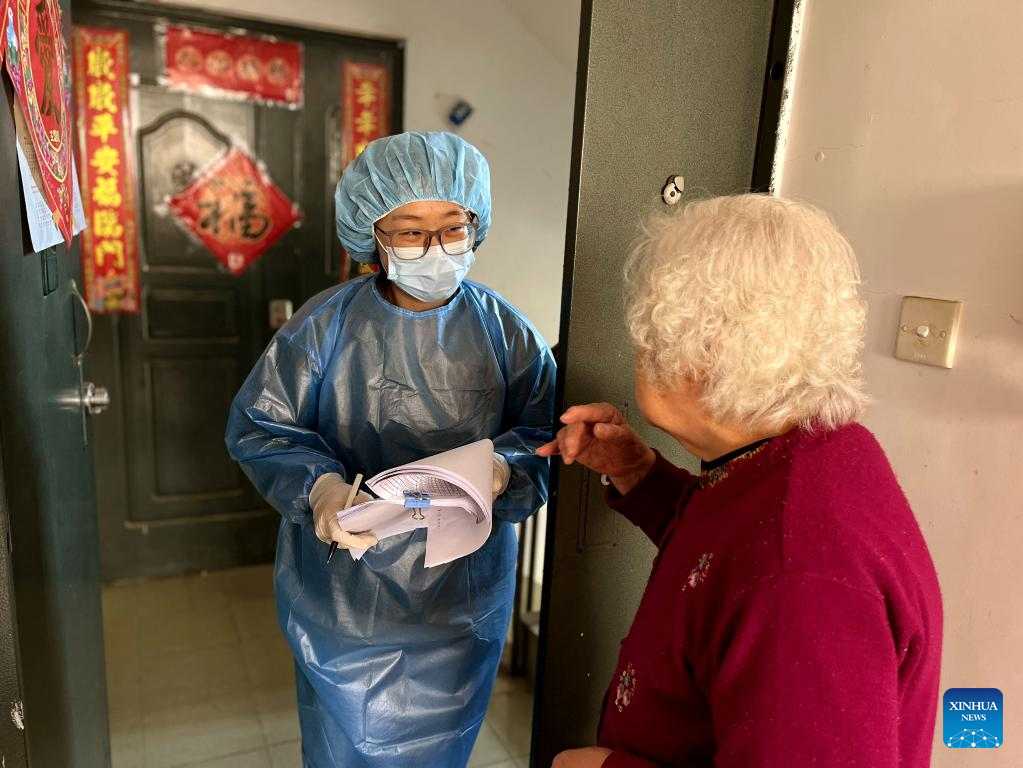Neighborhoods give elderly helping hand
By CAO CHEN in Shanghai | CHINA DAILY | Updated: 2022-04-01 09:30

Neighborhood committees in Shanghai have taken measures to care for the elderly living alone, as many neighborhoods in the city have been in closed-loop management to curb the spread of the virus.
Zhao Lixiang, a food courier who has served the elderly at Xianxia Xincun subdistrict in Changning district for the past two years, has taken on an extra workload recently, because the number of neighborhoods he covers has rocketed from three to nine.
The subdistrict has increased food deliveries for the elderly who cannot leave their homes during the lockdown.
Zhao collects takeaway meals from the subdistrict's public canteens every noon and then drives to each neighborhood. Instead of delivering food to residents' doorsteps, he hands them over to volunteers who pass the meals on to the seniors.
"The number of couriers in the subdistrict has declined due to the strict community management these days. It's natural that I take on the responsibility," he said. Data showed 1,680 elderly people in the district have used food delivery services offered by neighborhoods in March.
A 79-year-old resident surnamed Ren said he was "grateful for the kindness and convenience".
"The menu is diversified with vegetables, meat and rice. I can order in advance by making a phone call, and it costs less than 20 yuan ($3.15) per meal. I have trouble using smartphones to order food online, but my life goes on like always, thanks to the service," Ren said.
Food delivery services for the elderly are also offered in other areas including in North Bund subdistrict in Hongkou district. According to Ding Xiaojue, head of a civil service station at the subdistrict, the daily capacity of the subdistrict's public canteen has been increased from 400 to 700.
"Employees in good health and with negative nucleic acid tests have returned to work. Ingredients, cookware and packaging containers are fully prepared. We will guarantee the service for the elderly during the coming lockdown in the areas west of the Huangpu River," Ding said.
In Shanghai, a city with 3.82 million people aged 65 and above in 2020, special care for elderly citizens has been provided by many neighborhoods to lift their spirits and keep them safe amid the challenge.
A senior in her 80s surnamed Zhang, lives alone in Xinjing town, Changning district. She recently ran out of medicine to treat her diabetes and high blood pressure.
The difficulty of receiving medication under the closed-loop management was soon resolved by her neighborhood committee. Volunteers were dispatched to find out what medicines she needed to resupply her as soon as possible.
A collaboration has been established between the town's government and local Tongren Hospital to respond to the medical needs of elderly people. A green express lane has also been set up at the hospital for volunteers.
Volunteer teams have been assembled by neighborhood committees across the city to assist the elderly in taking nucleic acid tests, using smartphones and in almost all matters of daily life.
Zhang Lina, a volunteer from a psychological counseling association in Jing'an district, has dedicated herself to caring for seniors' mental health via phone in March, to keep up their spirits during the outbreak.
A senior surnamed Zhu has been one of Zhang's frequent "clients" in recent weeks. "I felt unconnected from society, wondering when the lockdown of my residential building would end after a COVID-19 case was confirmed and we were put under quarantine a few days ago," Zhu said.
Through regular phone calls, Zhang explained to him about the local prevention and control policies, the current situation and neighborhood services. She also told him about ways to protect himself from exposure to the virus and how to get daily necessities by phone.
"The closed-loop management period can be tough for seniors living alone. They may feel cut off, which can lead to anxiety," Zhang said. "It's vital to reassure them that they have a helping hand and support so they feel less lonely."
























